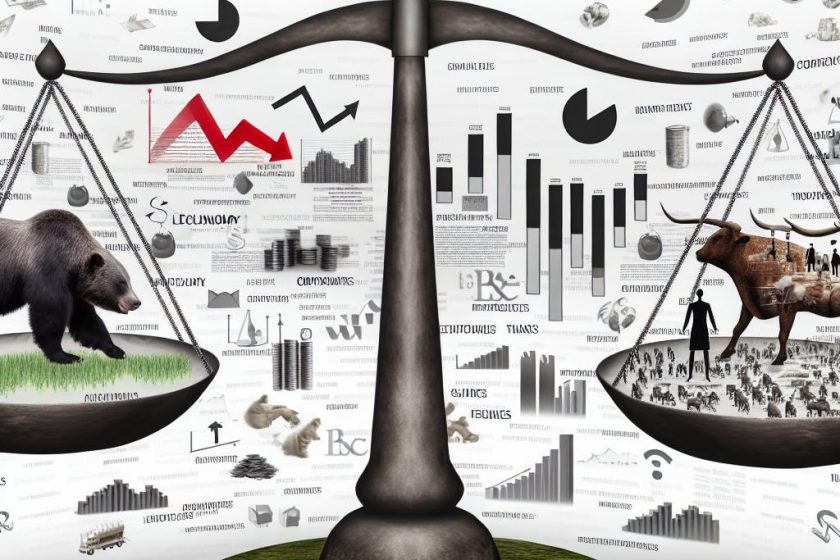The Interconnection Between the Economy and the Stock Market
The relationship between the economy and the stock market is an intricate and significant one. Understanding this interaction is crucial for investors, policymakers, and economic analysts. While the stock market is often viewed as a reflection of the economy’s health, this is not always the case. The nuances involved in this relationship can sometimes lead to misconceptions.
Understanding Economic Indicators
Economic indicators are essential tools used to gauge the health of an economy. These can include metrics such as Gross Domestic Product (GDP), unemployment rates, inflation, and consumer spending. Such indicators provide insight into the performance and growth potential of an economy.
The stock market, represented by indices like the S&P 500, the Dow Jones Industrial Average, and the NASDAQ, can influence and reflect these economic conditions. However, it’s important to remember that the stock market is reactive to a variety of factors, not solely economic ones.
The Stock Market as a Leading Indicator
The stock market is often considered a leading indicator of economic activity because it reflects investor sentiment about future corporate earnings and economic conditions. For example, a rising stock market may suggest that investors anticipate higher corporate profits, which could indicate future economic growth.
However, it’s essential to approach this assumption cautiously. Sometimes, stock prices can be influenced by factors unrelated to the underlying economy, such as interest rates, monetary policy, and global events. For more detailed insights, consider exploring analyses from reputable financial organizations like J.P. Morgan or Goldman Sachs.
Economic Downturns and Stock Market Reactions
Historically, economic downturns, such as recessions, often result in declining stock markets. This correlation stems from the expectation of reduced corporate earnings during such periods. For instance, during the Great Recession of 2008, the stock market experienced significant declines alongside a contracting economy.
Nevertheless, it is important to note that not all economic downturns or slowdowns lead to immediate stock market crashes. Sometimes, markets might react preemptively or based on the anticipation of recovery, influenced by government stimulus measures or monetary policy adjustments.
Market Reactions to Economic Policies
Economic policies can have varied impacts on the stock market. Fiscal policies, such as government spending and tax reforms, can boost investor confidence if they are seen as growth-friendly. On the other hand, monetary policies, such as interest rate changes by central banks, can directly influence stock prices by altering the cost of borrowing and investments.
For instance, a reduction in interest rates might lower borrowing costs for companies, enhancing their profitability and, in turn, boosting stock prices. Conversely, an increase in interest rates could have the opposite effect, as higher borrowing costs may lead to reduced corporate earnings expectations.
Global Influences on Domestic Markets
Global economic conditions also play a crucial role in shaping domestic stock market performance. International trade policies, geopolitical tensions, and global financial crises are among the numerous external factors that can impact national stock markets. These elements can cause fluctuations in investor confidence and market stability, often independent of a country’s domestic economic indicators.
For example, a trade agreement between major economies might enhance prospects for export-oriented industries, leading to a surge in their stock prices. Alternatively, a diplomatic conflict could trigger uncertainty, causing stock markets to falter despite stable domestic economic conditions.
Disconnections Between the Economy and the Stock Market
There are instances when the stock market and the economy move in divergent directions. This disconnection might occur due to various reasons, such as:
Speculation: The stock market sometimes undergoes phases of speculation that may not align with economic fundamentals. Investors, driven by short-term gain motives, might inflate stock prices beyond their intrinsic value, leading to a transient disconnection between market performance and economic realities.
Global Events: Unpredictable global events can cause short-term market disruptions without a corresponding impact on national economic indicators. Natural disasters, pandemics, or geopolitical upheavals can lead to investor panic and abrupt market movements that are detached from the ongoing economic activities.
Corporate Performance vs. Economic Growth: Companies can perform well in the stock market even in a slowing economy due to enhanced efficiency or profitable international operations. A firm might report high earnings and a strong stock performance based on cost-cutting measures or lucrative foreign ventures, diverging from domestic economic trends.
Understanding these factors helps clarify why the stock market might not always accurately reflect the current state of the economy.
Sectoral Disparities and Market Performance
Different sectors of the economy can have varying impacts on stock market performance. Some industries are more sensitive to economic changes than others, leading to disparities in stock movements. For instance, consumer discretionary and industrial stocks might be more volatile in response to economic shifts compared to utilities or consumer staples, which often remain stable due to constant demand.
Conclusion
The relationship between the economy and the stock market is multifaceted and can occasionally lead to perplexing correlations. While there is often an interconnection, it is essential to acknowledge that the stock market is not a perfect proxy for economic health. As such, investors and analysts must consider a range of indicators and factors when interpreting market movements and economic conditions. For ongoing analyses and insights, financial news platforms like Bloomberg offer comprehensive coverage of this complex relationship.
Informed decisions require analyzing a blend of economic indicators, market trends, and external influences. While historical data can guide expectations, the evolving nature of global economies and markets means that adaptability and vigilance are essential for accurate assessments.
This article was last updated on: August 21, 2025
